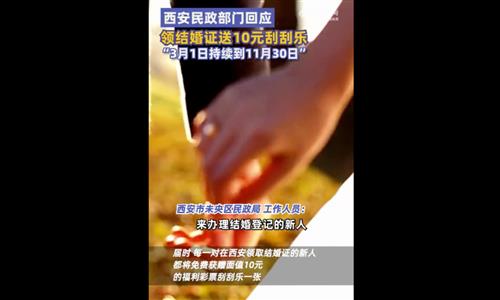China's supreme court solicits opinions on marriage and family laws; Article on Divorce Economic Assistance sparks debates

A couple pose for photos with their marriage certificates at a marriage registration office in Kaiyang County, southwest China's Guizhou Province, Aug. 22, 2023. Many couples chose to get married on Tuesday, which is the traditional Qixi Festival, or the Chinese Valentine's Day. Photo: Xinhua
China's Supreme People's Court is soliciting opinions on the Marriage and Family section of the Civil Code, as Article 20 on divorce economic assistance sparks public debates.
According to the document, Article 20 states that if one party in a divorce cannot maintain the basic living standard with personal property obtained during the divorce, and requests appropriate assistance from the other party with the ability to bear the burden, the people's court should support the request according to the law.
That is to say, if one party is economically disadvantaged and has no housing after the divorce, the people's court may, upon request of the party, order the other party, being able to bear the burden, to provide assistance, which may include: a certain period of free use of the other party's house; a reasonable amount of house rent; establishing a certain period of residence right through judgment; and other practical ways.
Legal experts said that this clause specifically mentions that if one party has no housing after the divorce and cannot maintain the local basic living standard, the other party needs to provide living and housing subsidies. This can protect vulnerable groups to some extent and adhere to the principle of fairness, they stressed.
At the same time, many netizens believe that this clause is similar to the spousal support system in foreign countries, where one party needs to provide financial support to the other after divorce. Some netizens also believe that this clause may cause couples who have significant economic disparities to become reluctant to get married.
In response, legal experts stated that this clause only requires assistance to help the economically disadvantaged party to maintain the "local basic living standard," while the purpose of the spousal support system in foreign countries is to help the economically disadvantaged party maintain a "similar standard of living during marriage," which is significantly different. This clause emphasizes the protection of marital property and the interests of vulnerable groups, and will not create pressure for couples who want to get married, experts said.
During the divorce process, there are many ways to divide property, Zhu Wei, a vice director of the Communication Law Research Center at the China University of Political Science and Law, told the Global Times on Tuesday. For example, at the beginning, voluntary division of property is carried out, and if voluntary agreement cannot be reached, then the court will be involved in the division.
Generally, the principle followed is to benefit the party responsible for taking care of the children and the party without fault, he said. After the division, according to the relevant provisions of the Marriage Law, if one party is at fault, they may have to compensate the innocent party for damages, which is a compensatory division.
Assistance division is actually a method of division that has been mentioned in the Civil Code before, Zhu explained. After divorce, one party may not have a place to live and their standard of living may not meet the relevant standards of the city. If they are not provided with assistance, it may bring burden to society, other families and the children of the original family. "This also aligns with the traditional Chinese viewpoint, as even though the couple has separated, they should still fulfill their obligations to each other as they promised when they got married," he noted.
It is worth mentioning the way in which the court can now grant a certain period of residency rights, which is the first time it has been proposed, improving the previously controversial aspects, the expert noted.



